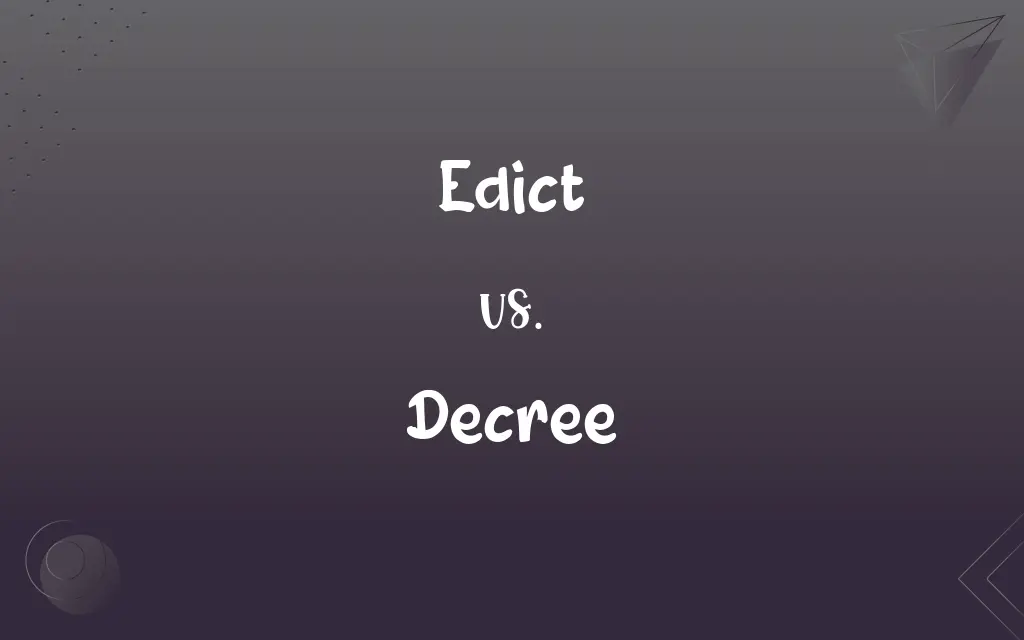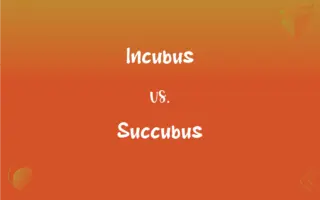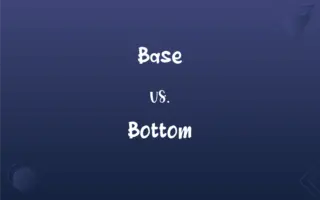Edict vs. Decree: What's the Difference?
By Aimie Carlson & Harlon Moss || Updated on May 22, 2024
An edict is an official order or proclamation issued by a person in authority, often with the force of law. A decree is a formal and authoritative order, particularly one having the force of law, issued by a ruler or government.

Key Differences
An edict is a formal proclamation or command issued by an authority figure, often having the force of law. It is typically associated with monarchs or other high-ranking officials. Edicts are usually meant to announce new laws, policies, or changes that must be followed by the public. A decree, on the other hand, is a formal and authoritative order issued by a ruler or governing body. While an edict can be broader in its application, a decree is often more specific, detailing particular actions or decisions that need to be implemented. Decrees are commonly used in both civil and religious contexts.
Edicts often carry a more traditional or historical connotation, reflecting the power dynamics of ancient and medieval societies where monarchs issued proclamations. Decrees, however, are frequently used in modern governance, reflecting a structured legal approach to decision-making and policy implementation.
Both edicts and decrees are forms of authoritative directives, but their use and connotation can vary significantly based on the context and the issuing authority. An edict can be seen as more ceremonial or symbolic, whereas a decree tends to be more operational, providing specific instructions or mandates.
In terms of issuance, an edict might be issued in situations requiring broad compliance from the populace, such as declaring a public holiday or enforcing a new tax law. A decree, however, might be used to implement specific administrative decisions, such as the appointment of officials or the execution of particular government programs.
While both terms imply a top-down approach to governance, the nuances in their application and the contexts in which they are used distinguish them from one another. Edicts generally imply a broader, more sweeping directive, whereas decrees are often detailed, procedural, and specific.
ADVERTISEMENT
Comparison Chart
Definition
Official order or proclamation by an authority
Formal authoritative order by ruler or government
Connotation
Traditional, historical
Modern, legal
Scope
Broad, general compliance
Specific, detailed instructions
Context
Often ceremonial or symbolic
Operational and procedural
Usage
Issuing new laws, public announcements
Implementing administrative decisions
ADVERTISEMENT
Edict and Decree Definitions
Edict
An authoritative decree issued by a sovereign.
The edict declared a day of mourning throughout the kingdom.
Decree
An authoritative decision with legal authority.
The president's decree allocated funds for disaster relief.
Edict
A proclamation with legal force.
The council's edict restricted hunting in the royal forest.
Decree
An edict issued to enforce laws or regulations.
The mayor's decree required masks in all public places.
Edict
A public order that must be obeyed.
According to the edict, the festival would start at sunrise.
Decree
A formal order issued by a ruler or government.
The government issued a decree imposing a curfew.
Edict
An official proclamation issued by an authority.
The king issued an edict banning the use of plastic bags.
Decree
A mandate that has the force of law.
The decree ordered the construction of new schools.
Edict
A formal command with the force of law.
The emperor's edict required all citizens to pay a new tax.
Decree
An authoritative order having the force of law.
Edict
A decree or proclamation issued by an authority and having the force of law.
Decree
The judgment of a court of equity.
Edict
A formal pronouncement or command.
Decree
The judgment of a court.
Edict
A proclamation of law or other authoritative command.
Decree
A doctrinal or disciplinary act of an ecclesiastical authority.
Edict
A public command or ordinance by the sovereign power; the proclamation of a law made by an absolute authority, as if by the very act of announcement; a decree; as, the edicts of the Roman emperors; the edicts of the French monarch.
It stands as an edict in destiny.
Decree
An administrative act applying or interpreting articles of canon law.
Edict
A formal or authoritative proclamation
Decree
To order, establish, or decide by decree
Decreed that the two kingdoms would be united.
Edict
A legally binding command or decision entered on the court record (as if issued by a court or judge);
A friend in New Mexico said that the order caused no trouble out there
Decree
To issue a decree.
Decree
An edict or law.
Decree
(legal) The judicial decision in a litigated cause rendered by a court of equity.
Decree
(legal) The determination of a cause in a court of admiralty or court of probate.
Decree
(religion) A predetermination made by God; an act of providence.
Decree
To command by a decree.
A court decrees a restoration of property.
Decree
An order from one having authority, deciding what is to be done by a subordinate; also, a determination by one having power, deciding what is to be done or to take place; edict, law; authoritative ru decision.
There went out a decree from Cæsar Augustus that all the world should be taxed.
Poor hand, why quiverest thou at this decree?
Decree
A decision, order, or sentence, given in a cause by a court of equity or admiralty.
Decree
An edict or law made by a council for regulating any business within their jurisdiction; as, the decrees of ecclesiastical councils.
Decree
To determine judicially by authority, or by decree; to constitute by edict; to appoint by decree or law; to determine; to order; to ordain; as, a court decrees a restoration of property.
Thou shalt also decree a thing, and it shall be established unto thee.
Decree
To ordain by fate.
Decree
To make decrees; - used absolutely.
Father eternal! thine is to decree;Mine, both in heaven and earth to do thy will.
Decree
A legally binding command or decision entered on the court record (as if issued by a court or judge);
A friend in New Mexico said that the order caused no trouble out there
Decree
Issue a decree;
The King only can decree
Decree
Decide with authority;
The King decreed that all first-born males should be killed
Decree
An official ruling or judgment.
The court's decree finalized the divorce settlement.
FAQs
In what contexts are edicts used?
Edicts are often used in historical or traditional contexts, such as royal proclamations or public announcements.
How do edicts and decrees differ in scope?
Edicts typically have a broader scope, requiring general compliance, while decrees are more specific and detailed.
What is an edict?
An edict is an official order or proclamation issued by a person in authority, often with legal force.
Can edicts be considered laws?
Yes, edicts often have the force of law and require compliance from the public.
What is a decree?
A decree is a formal and authoritative order, particularly one with the force of law, issued by a ruler or government.
Are decrees used in religious contexts?
Yes, decrees can also be issued by religious authorities to govern religious practices.
In what contexts are decrees used?
Decrees are commonly used in modern legal and administrative contexts to implement specific policies or decisions.
Can an edict be challenged in court?
It depends on the legal system, but generally, edicts issued by sovereigns are not easily challenged.
Who typically issues edicts?
Edicts are typically issued by monarchs, emperors, or high-ranking officials.
Are decrees legally binding?
Yes, decrees are legally binding orders issued by an authority.
Who typically issues decrees?
Decrees are issued by rulers, presidents, governments, or courts.
What is the main purpose of a decree?
The main purpose of a decree is to implement specific actions, decisions, or policies.
What is the main purpose of an edict?
The main purpose of an edict is to announce new laws, policies, or changes that need public compliance.
Can a decree be challenged in court?
Yes, decrees can often be challenged or reviewed by judicial systems.
Are edicts and decrees synonymous?
While similar, they are not synonymous; edicts are broader proclamations, whereas decrees are specific orders.
Do decrees need to be publicly announced?
Decrees may be publicly announced, but some can be internal orders within governments or organizations.
What is a modern example of a decree?
A presidential decree establishing a national holiday or allocating emergency funds.
Do edicts still exist today?
Yes, while less common, edicts are still used in some countries and contexts.
Do edicts need to be publicly announced?
Yes, edicts are typically announced publicly to ensure compliance.
What is a historical example of an edict?
The Edict of Nantes, issued in 1598 by Henry IV of France, granted religious freedom to Protestants.
About Author
Written by
Aimie CarlsonAimie Carlson, holding a master's degree in English literature, is a fervent English language enthusiast. She lends her writing talents to Difference Wiki, a prominent website that specializes in comparisons, offering readers insightful analyses that both captivate and inform.
Co-written by
Harlon MossHarlon is a seasoned quality moderator and accomplished content writer for Difference Wiki. An alumnus of the prestigious University of California, he earned his degree in Computer Science. Leveraging his academic background, Harlon brings a meticulous and informed perspective to his work, ensuring content accuracy and excellence.
































































